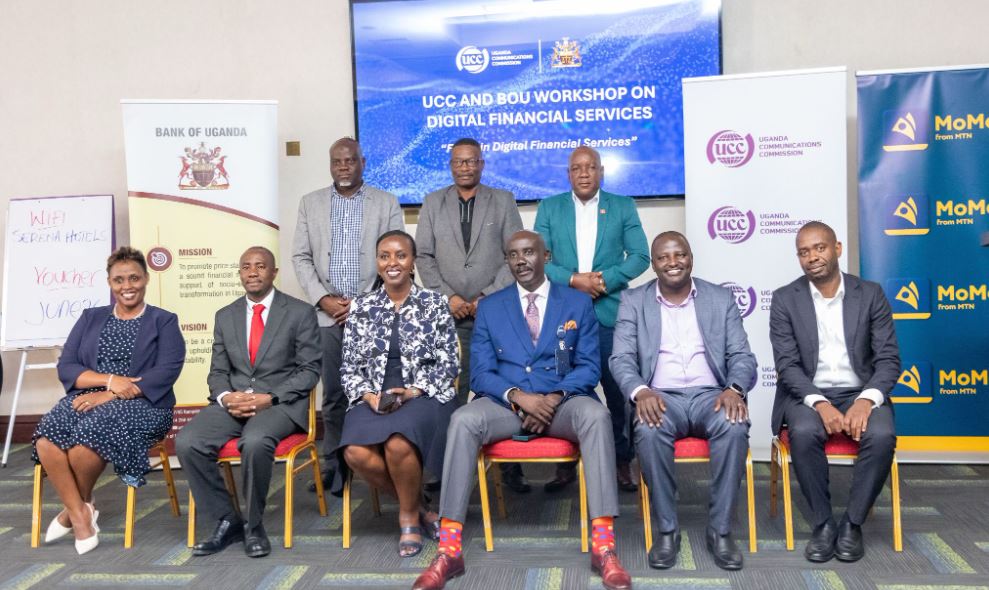
The Uganda Communications Commission (UCC) on Thursday convened a crucial Digital Financial Services Workshop in Kampala, bringing together a formidable alliance of telecom companies, banks, law enforcement, and key regulatory bodies to forge a united front against the crime.
Julianne Mweheire, the Director of Economic Regulation, Content and Consumer Affairs at UCC, articulated the transformative impact of DFS in Uganda.
“Digital Financial Services have become a vital pillar of financial inclusion, empowering millions, particularly in rural and unbanked communities,” she said, adding, “They have transformed Uganda’s access and the use of financial services, providing greater convenience, accessibility, and economic empowerment for individuals and businesses alike.”
Indeed, official figures highlight this remarkable shift. According to Mweheire, Mobile money registrations in Uganda surged to 36.8 million in 2023, with 64% of adults embracing digital transfer services, a major leap from 57% in 2018.
This digital embrace, Mweheire noted, has notably bridged gender and geographic divides, with 61% of women and 67% of men using these services, and at least 60% of rural residents joining the digital financial wave.
This explosion of digital adoption, she noted, has been heavily facilitated by UCC’s regulatory support, providing vital authorisations for mobile network operators to launch and expand these services.
Mweheire further highlighted UCC’s role in enhancing the integrity of financial transactions through the stringent SIM card “Know Your Customer” (KYC) process.
“By utilising the widespread use of SIM cards, we have effectively anchored financial services in a dependable identification system. This development is vital for fostering trust and accessibility within our financial landscape,” she asserted.
According to Mweheire, this process, in collaboration with the Bank of Uganda, points to a shared commitment to fostering a secure and resilient digital ecosystem.
Why Fighting Fraud is Crucial
Despite these foundational wins by UCC, digital fraud remains a formidable challenge.
A 2021 report revealed that 47% of Ugandans using DFS had faced attempted fraud via phone or SMS, with 33% encountering phishing attempts.
Worryingly, most victims don’t report, leading to significant financial losses and an erosion of trust in the formal financial system, often pushing vulnerable populations back into cash-based or informal methods.
Mweheire pointed out that fraud not only costs individuals and businesses billions but also diverts critical resources from financial service providers that could otherwise be used for expanding services and driving innovation.
Representing MTN MoMo at the workshop were CEO Richard Yego, Dennis Kakonge, the General Manager for Corporate Services, and Israel Mayengo, the Company Secretary.
Yego minced no words, stating, “While fraudsters are evolving, so must we. Our platforms need both technical reinforcement and user awareness. Only with collaboration across telcos, banks, and regulators can we truly fight SIM card fraud.”
His sentiment was echoed by Dr. Tumubweine Tweinemanzi, the Executive Director, National Payments System at the Bank of Uganda, who underscored the importance of collaboration in combating digital financial fraud.
“As regulators, policymakers, and ecosystem stakeholders, our task is clear: we must minimise the downside, particularly the threats posed by fraud, and maximise the upside of digital financial services, which are now central to Uganda’s economy and its future,” Tweinemanzi said.
“There’s more work ahead,” Dr. Tweinemanzi acknowledged, adding, “But with shared responsibility, open dialogue, and a commitment to user protection, we believe a safer digital future is possible.”
Forging Stronger Partnerships
Mweheire observed that the workshop served as a crucial “call to action,” taking stock of progress since previous engagements, examining the evolving tactics of fraudsters, and, most importantly, identifying ways to forge greater partnerships to tackle emerging threats. The shared objectives are clear:
Strengthen Regulatory Frameworks
Continuously adapt and reinforce the legal and operational guidelines governing DFS to keep pace with technological advancements and criminal ingenuity.
Leverage Technological Innovations
Implement cutting-edge cybersecurity solutions, including AI-driven fraud detection and prevention tools.
Equip Customers with Knowledge
Launch comprehensive public education campaigns to raise awareness about common fraud schemes and empower users with the knowledge to safeguard themselves.
This collaborative spirit, uniting stakeholders across the financial and technological landscape, is not just a hope but a necessity for Uganda to secure its digital economy and ensure that its financial revolution continues to empower citizens, safely and securely.
